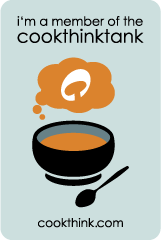Reently, a politicaly and humanely aware friend sent me a series of photographs with dollar numbers representing the disparities of the way in which the world eats and how much it pays for it. the pictures were not totally informative as they did not say whether the families lived in urban or rural settings nor whether they lived in a climate that supports a great deal of local agriculture or home food growing. Aside from the obvious and sad picture of a barely subsistance African family's diet, the dollar amounts were not so different; but what was similar was the amount of packaged food.
Carrying string bags to market and avoiding water in plastic bottles is not enough of a consumer consumption effort. Glass bottles of water require an enormous input of energy for recycling. Home filters would be just as effective, or even better a cleaning up of local water supplies. I am lucky to live in New York which has good tap water and in Vermont where I have fabulous well water. In restaurants, I refuse the ubiquitous and uniformly offered bottled water. I save money and do a little bit for the planet. Also, much bottled water is high in sodium which is not good for those with blood pressure problems.
It certainly will not solve the problem of global warming; but we should avoid heavily packaged food which is what is most offered in stores. This would also push us to local and organic food--a good thing. Since a great percentage of the the methane in the air comes from the defecation of farm animala, a reduction in meat eating would also help the environment and possibly even our health even though I am not a vegetarian. Just make fruits and vegetables--unpackaged--a greater part of the meal.
I have even given up plastic bags--small--in markets that I used to use to clean up after my dog. Certainly that was one level of recycling; but newspaper can work as well.
Health food stores will often sell cereals and other dry foods from bins and paper bags can be used. Ethnic markets will do the same thin with olives and the like. To avoid more plastic, recycle the bottles--plastic and glass--that are already on hand to fill with these products.
We are not in control; but we can contribute.
Subscribe to:
Post Comments (Atom)


No comments:
Post a Comment